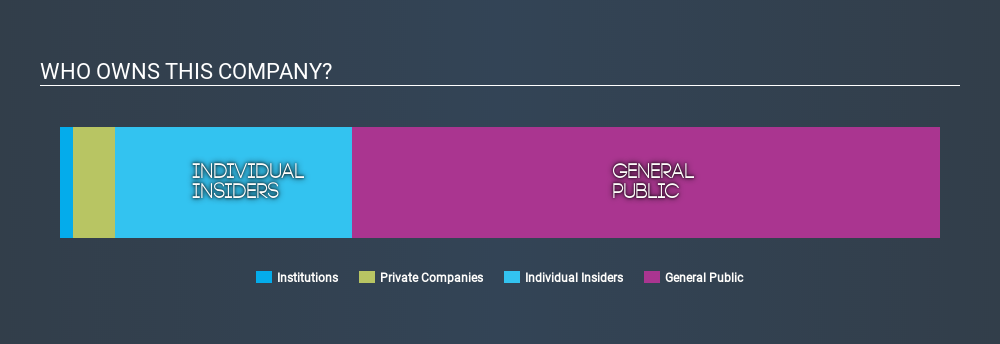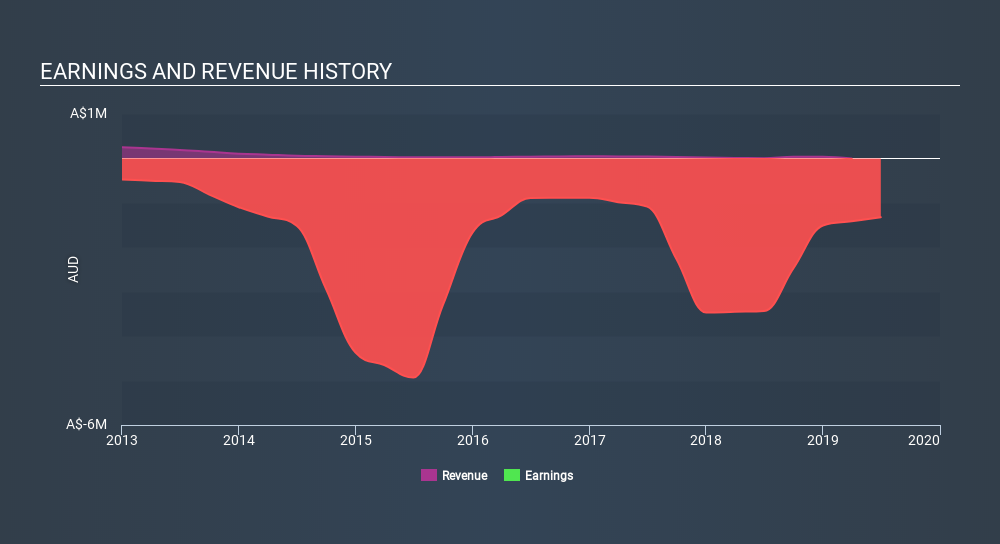- Australia
- /
- Metals and Mining
- /
- ASX:RNU
What Kind Of Shareholder Appears On The Renascor Resources Limited's (ASX:RNU) Shareholder Register?

The big shareholder groups in Renascor Resources Limited (ASX:RNU) have power over the company. Institutions often own shares in more established companies, while it's not unusual to see insiders own a fair bit of smaller companies. I generally like to see some degree of insider ownership, even if only a little. As Nassim Nicholas Taleb said, 'Don’t tell me what you think, tell me what you have in your portfolio.
Renascor Resources is a smaller company with a market capitalization of AU$14m, so it may still be flying under the radar of many institutional investors. Taking a look at our data on the ownership groups (below), it's seems that institutional investors have not yet purchased much of the company. Let's delve deeper into each type of owner, to discover more about Renascor Resources.
View 5 warning signs we detected for Renascor Resources

What Does The Institutional Ownership Tell Us About Renascor Resources?
Institutional investors commonly compare their own returns to the returns of a commonly followed index. So they generally do consider buying larger companies that are included in the relevant benchmark index.
Less than 5% of Renascor Resources is held by institutional investors. This suggests that some funds have the company in their sights, but many have not yet bought shares in it. If the business gets stronger from here, we could see a situation where more institutions are keen to buy. It is not uncommon to see a big share price rise if multiple institutional investors are trying to buy into a stock at the same time. So check out the historic earnings trajectory, below, but keep in mind it's the future that counts most.

Renascor Resources is not owned by hedge funds. David Clarke is currently the largest shareholder, with 11% of shares outstanding. The second largest shareholder with 3.6%, is Richard Keevers, followed by David Vigolo, with an ownership of 3.1%.
Our studies suggest that the top 19 shareholders collectively control less than 50% of the company's shares, meaning that the company's shares are widely disseminated and there is no dominant shareholder.
While studying institutional ownership for a company can add value to your research, It is also a good practice to research analyst recommendations to get a deeper understand of a stock's expected performance. There is some analyst coverage of the stock, but it could still become more well known, with time.
Insider Ownership Of Renascor Resources
The definition of company insiders can be subjective, and does vary between jurisdictions. Our data reflects individual insiders, capturing board members at the very least. Management ultimately answers to the board. However, it is not uncommon for managers to be executive board members, especially if they are a founder or the CEO.
Most consider insider ownership a positive because it can indicate the board is well aligned with other shareholders. However, on some occasions too much power is concentrated within this group.
Our information suggests that insiders maintain a significant holding in Renascor Resources Limited. It has a market capitalization of just AU$14m, and insiders have AU$3.8m worth of shares in their own names. When analysing a company, looking at ownership may seem a logical place to start. But ultimately, many risks exist within the business itself, rather than its shareholders. For example, we've discovered 5 warning signs for Renascor Resources (of which 3 are major) which any shareholder or potential investor should be aware of.
General Public Ownership
The general public, who are mostly retail investors, collectively hold 67% of Renascor Resources shares. With this size of ownership, retail investors can collectively play a role in decisions that affect shareholder returns, such as dividend policies and the appointment of directors. They can also exercise the power to decline an acquisition or merger that may not improve profitability.
Private Company Ownership
Our data indicates that Private Companies hold 4.8%, of the company's shares. It might be worth looking deeper into this. If related parties, such as insiders, have an interest in one of these private companies, that should be disclosed in the annual report. Private companies may also have a strategic interest in the company.
Next Steps:
While it is well worth considering the different groups that own a company, there are other factors that are even more important.
I like to dive deeper into how a company has performed in the past. You can find historic revenue and earnings in this detailed graph.
If you would prefer discover what analysts are predicting in terms of future growth, do not miss this free report on analyst forecasts.
NB: Figures in this article are calculated using data from the last twelve months, which refer to the 12-month period ending on the last date of the month the financial statement is dated. This may not be consistent with full year annual report figures.
If you spot an error that warrants correction, please contact the editor at editorial-team@simplywallst.com. This article by Simply Wall St is general in nature. It does not constitute a recommendation to buy or sell any stock, and does not take account of your objectives, or your financial situation. Simply Wall St has no position in the stocks mentioned.
We aim to bring you long-term focused research analysis driven by fundamental data. Note that our analysis may not factor in the latest price-sensitive company announcements or qualitative material. Thank you for reading.
About ASX:RNU
Renascor Resources
Engages in the exploration, development, and evaluation of mineral properties in Australia.
Flawless balance sheet slight.
Similar Companies
Market Insights
Community Narratives



